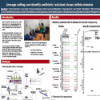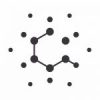CCDD’s poster “Lineage calling can identify antibiotic resistant clones within minutes” presented at the Lake Arrowhead Microbial Genomics (LAMG) Conference by CCDD researchers Karel Břinda, Lauren Cowley, Derek MacFadden, Prof. Bill Hanage and collaborators is recognized as the “Most Innovative” poster of the conference. You can read more about the study here.
Leading with Science: One Year After Hurricane Maria
On the anniversary of Hurricane Maria in Puerto Rico CCDD’s Prof. Caroline Buckee and colleagues came together in a panel discussion “Beyond Hurricane Maria: Leading With Science” hosted by Harvard FXB Center for Health and Human Rights. The panelists discussed the motivation and rationale for the study, the significance of their findings, the impact of their research, and their decision to release all their data and code online. You can…
Continue reading “Leading with Science: One Year After Hurricane Maria”
Make A Flu Shot Your Halloween Tradition
CCDD Director Prof. Lipsitch is featured in an interview to FiveThirtyEight sharing his views about flu, vaccination and best timing for it. According the Dr. Lipsitch there are several studies showing that the effectiveness of the flu vaccine wanes towards the end of the season. The bottom line- it is better to get the vaccine later in the season as you have better chances of being protected from flu. Related…
Puerto Rico’s Hurricane Maria Death Toll Could Exceed 4,000, New Study Estimates
In a New England Journal of Medicine study, CCDD researchers, Prof. Caroline Buckee, Nishant Kishore, Ayesha Mahmud, and Mathew Kiang, along with others from Harvard and Puerto Rico, found that residents of Puerto Rico died at a significantly higher rate during the three months after Hurricane Maria than they did in the previous year. The researchers conducted more than 3,000 household surveys and found that one third of deaths reported were attributed…
Continue reading “Puerto Rico’s Hurricane Maria Death Toll Could Exceed 4,000, New Study Estimates”
Vaccines Are Pushing Pathogens to Evolve
In a new Quanta Magazine article, “Vaccines are Pushing Pathogens to Evolve”, Dr. Bill Hanage reflects on his days as a young scientist with the introduction of the Prevenar 7 vaccine in the early 2000s. “It struck me, with my almost complete lack of formal training in evolutionary biology, that this was an extraordinary evolutionary experiment,” he said. This now forms the basis for much of his work on how pneumococcus…
CCDD Highlighted on 80,000 Hours Podcast
A new podcast from 80,000 Hours cites CCDD Director Marc Lipsitch’s research group as a great place to work on the quantitative / epidemiologic aspects of pandemics and health security. The podcast is an interview with Dr. Tom Inglesby, Director of the Johns Hopkins Center for Health Security. This echoes a recommendation made on a previous episode of the same podcast by another guest, Howie Lempel.
CCDD Publication Selected as Article of the Year- AJE
Congratulations to researchers Colin Worby, Marc Lipsitch and Bill Hanage, whose recent CCDD publication was selected by the Society for Epidemiologic Research and the American Journal of Epidemiology as one of ten articles of the year. Lipsitch and Hanage are CCDD faculty members, and Worby is an alumni of the Center, now at Princeton. Worby CJ, Lipsitch M, Hanage WP. Shared genomic variants: identification of transmission routes using pathogen deep-sequence data. Am J Epidemiol.2017;186(10):1209–1216. Read the full…
Continue reading “CCDD Publication Selected as Article of the Year- AJE”
Mumps resurgence likely due to waning vaccine-derived immunity
“A resurgence of mumps in the U.S. among vaccinated young adults appears to be due to waning of vaccine-induced immunity, according to a new analysis from Harvard T.H. Chan School of Public Health. Featured work of CCDD researchers Joseph Lewnard and Yonaton Grad. Mumps resurgence likely due to waning vaccine-derived immunity
Mumps outbreaks linked to waning vaccine protection, study says
A new study by CCDD’s Joseph Lewnard and Yonatan Grad found that a resurgence in mumps cases may be due to waning vaccine protection over time. A third booster shot for young adults may extend protection, and prevent spread of the disease. “‘The pattern we observed is a lot more consistent with what we would expect from a waning vaccine,’ said Joseph A. Lewnard, co-author of the study and a postdoctoral…
Continue reading “Mumps outbreaks linked to waning vaccine protection, study says”
Why so many college students are coming down with the mumps
CCDD researchers Joseph Lewnard and Yonatan Grad‘s work on mumps re-emergence provides new insights around the vaccine’s effectiveness and the duration of immunity. This has particularly important implications for young adults. Read the Science Magazine article here.










